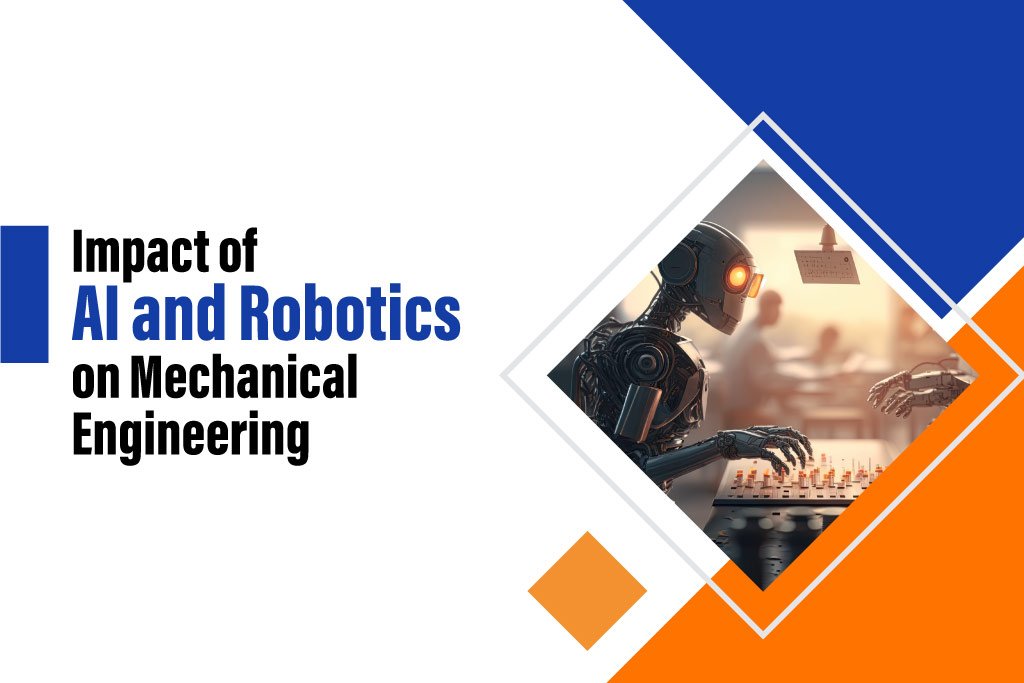
Do you know that the collaboration of AI and robotics in mechanical engineering is translating the industry in remarkable ways? This technology makes the design and manufacturing processes simpler and also helps boost the maintenance and optimization processes, which is causing a far-reaching impact!
Changing dynamics in mechanical engineering
From designing automobiles to constructing infrastructure, the field of mechanical engineering has a critical role to play in our daily lives. With an extensive scope, it is making a deep impact across sectors.
The field is not just about gears and engines, the technological developments in recent times have significantly helped to make immense progress. Today, mechanical engineering is more about building futuristic and efficient systems by combining the latest technology.
Mechanical Engineering program at KCE:
The mechanical engineering courses at Karpagam College of Engineering (KCE) are created to prepare our students to successfully launch their career journey. We ensure they are well-equipped to tackle today’s complex workplace challenges. Our programs are more comprehensive and are balanced with electives like Artificial Intelligence, Machine Learning, cloud computing and the Internet of Things.
At KCE, one of the best mechanical engineering colleges in Tamil Nadu, we encourage our students to develop an inquisitive mindset and urge them to explore to make ground-breaking innovations.
If you are curious about learning how AI and robotics are metamorphosing mechanical engineering, then this blog is for you! Read on to learn about the key areas that have been influenced by combining AI and robotics in mechanical engineering.
1) AI in engineering design: With novel approaches, AI is making a paradigm shift in engineering design. AI algorithms analyze huge datasets which enable engineers to quickly create design prototypes, validate designs, and forecast potential issues. All this is possible as it allows to explore several design variations and refine concepts with astonishing speed.
2) Machine learning applications: Machine learning, a subdomain of AI, has extensive applications in mechanical engineering. Machine learning algorithms are used to forecast potential equipment failures, this allows engineers to handle maintenance requirements systematically by scheduling preventive maintenance activities. Moreover, it finetunes the parameters and validates the processes to improve the outcomes in various mechanical systems.
3) Automation in manufacturing: Complex jobs in the production line are carried out easily by combining robots and autonomous systems with AI capabilities. This approach has helped improve precision, speed and consistency, thereby promising product quality and operational efficiency in the manufacturing processes.
4) Improved precision and efficiency: AI boosts accuracy in various mechanical engineering jobs, especially in quality control and inspection domains. Computer vision powered by AI allows professionals to analyze manufacturing processes and identify defects and deviations with high accuracy concurrently; this approach improves product quality and operational efficiency.
5) Cognitive Robotics: Cognitive robotics is a combination of AI, robotics and cognitive science, where futuristic robotic systems adjust to dynamic environmental conditions and gain insights to perform complex tasks skillfully. Cognitive robotics is used in production assembly lines and also to accomplish complex functions in hazardous environments.
6) Smart manufacturing: Smart manufacturing or Industry 4.0 is about linking devices, machines and sensors with AI-driven systems. This approach initiates real-time data sharing, to help stabilize the entire production chain and decision-making process.
7) Data-driven decision-making: AI algorithms process large volumes of data and generate insights to help professionals during simulations, data analysis and performance monitoring. Mechanical engineers use these data-driven insights to make critical decisions to solve problems.
8) Energy efficiency and sustainable approaches: AI algorithms use resources and processes based on real-time needs and environmental conditions to help stabilize energy usage. This approach optimizes resource utilization by bringing down operational costs and also enables your organization to work in-line with sustainability objectives.
9) Human-machine collaboration: Mechanical engineers are now able to work in tandem with artificial intelligence systems by combining AI technologies. This enables them to make the most of its sizeable computing capabilities to accomplish complex calculations, simulations and analysis. This synergy between humans and machines enriches the proficiencies of mechanical engineers.
10) Continual improvements: The advantage of using AI in mechanical engineering is it can learn and evolve to real-time environmental scenarios. As AI systems keep engaging with data, gradually it enables them to tweak their algorithms and processes. This further helps them to continuously evolve and further amplify their performance, efficiency and problem-solving competencies.
AI and machine learning competencies have altered the processes in multiple industry sectors due to their unmatched efficacy and ingenuity. Its smart automation features have helped redefine design and manufacturing processes, making it a vital dimension of the mechanical engineering field.
Also, the combined efforts of human expertise and AI capabilities are helping the field to make speedy progress on the technological front with unmatched precision and sustainability. AI has become a game-changer, driving the field of mechanical engineering to achieve novel prospects with continual improvements.
KCE nurtures a new generation of creators and innovators. We not only teach the fundamentals but also introduce our students to the latest advancements that are influencing the future of engineering, which makes us one of the top mechanical engineering colleges in TamilNadu.
